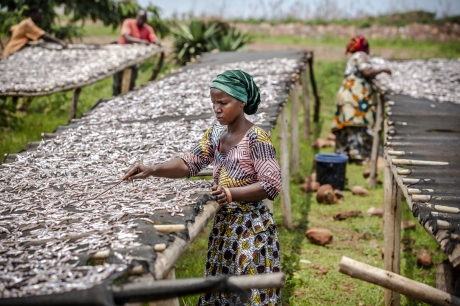Reducing losses from fish harvests changes the work and future of Tanzania’s women fish processors
FAO’s FISH4ACP programme empowers women to address falling yields and discrimination
When Suzana Hamimu Kaleju began working as a fish processor 30 years ago in the port of Kigoma, she used to lay the sprat, a type of herring, on the shores of Lake Tanganyika before selling her dried fish in local and regional markets.
They would get dusty or sandy so they would fetch lower prices. Sometimes goats would even eat them, but that was all she could do without drying racks or other tools. It was what she and the other local fish processors always did.
Suzana, like her mother before her, grew up in the United Republic of Tanzania, right on this lake, which borders Burundi, the Democratic Republic of Congo and Zambia. It is the world’s second largest freshwater lake and accounts for 40 percent of Tanzania’s annual fish catch.
Small-scale fishers and fish processors, like Suzana, account for a large share of the workforce in Tanzania’s sardine, sprat and perch fisheries, a sector that employs 27 000 fishers and 11 000 processors in total.
Although the men still do most of the fishing, it is the women who dry and process the fish for selling. Nearly 90 percent of the fish processors in Tanzania are women and many work as roadside vendors, restaurant owners, wholesalers and retailers.
While two-thirds of the catch is consumed locally, exports of Lake Tanganyika’s sprat, sardine and perch are worth almost USD 1 million a year.
However, poor fishing methods, climate change impacts and Illegal, Unreported and Unregulated (IUU) fishing have all contributed to declining yields in recent years. Furthermore, fish processors in the region lose much of their harvest due to poor refrigeration, inadequate handling or poor processing techniques.
Through its FISH4ACP programme, FAO is aiming to address these post-harvest challenges, as well as declining yields by implementing more sustainable value chains for sardines, sprat and perch, while contributing to the conservation of Lake Tanganyika’s natural resources.
An initiative of the Organization of African, Caribbean and Pacific States, FISH4ACP contributes to food and nutrition security and prosperity and job creation by safeguarding the economic, social and environmental sustainability of fisheries and aquaculture value chains.
FAO’s FISH4ACP is funded by the European Union and the German Federal Ministry for Economic Cooperation and Development, and, in Tanzania, the programme is implemented in partnership with the Tanzania Fisheries Research Institute.

